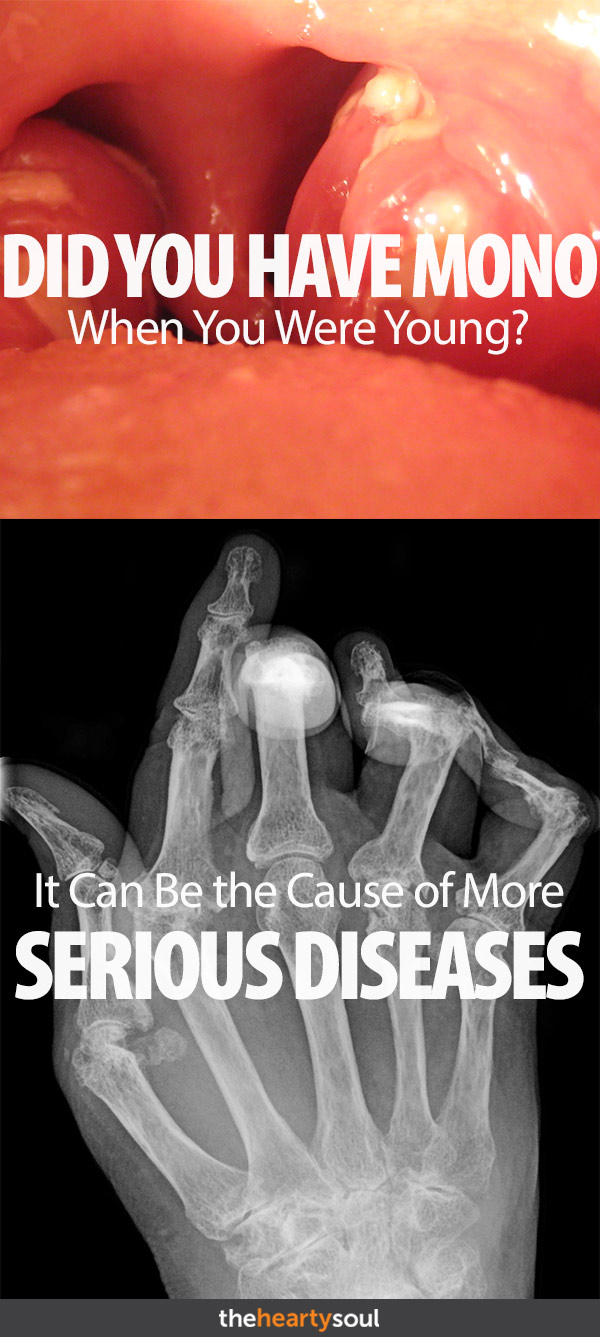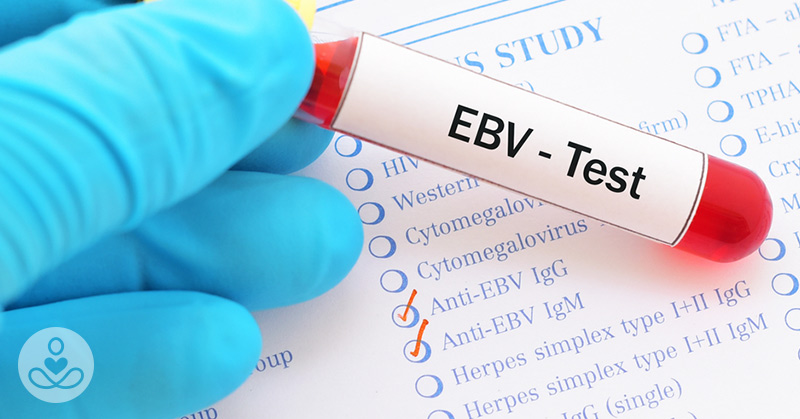This article was originally published in May 2018 and has since been updated.
Mononucleosis is an often harmless infectious illness caused by the Epstein-Barr virus. It is known as “the kissing disease” because it’s contagious and spread mainly through saliva. The virus is very common and a lot of people are exposed to it in adolescence. The symptoms of mono are similar to that of the flu and with time will go away, but what doesn’t leave your body is the virus. In fact, 90% of adults are infected with the disease by the time they reach 40. (1)
Epstein-Barr Virus and How it Can Change Your Cells
A recent study done at the Cincinnati Children’s Hospital found that the Epstein-Barr virus can also increase the risk of developing not only mononucleosis but seven other serious diseases. John Harley, one of the scientists that worked on the study explains, “using genomic methods that were not available 10 years ago, it appears that components made by the virus interact with human DNA in the places where the genetic risk of disease is increased”. (2)
The genome is the set of genes in a cell. They work alongside transcription factors in our body to tell the cell its function and how to respond to its environment. The Epstein-Barr virus impacts the white blood cells, changing their transcription factors and how they react to the body. Depending on how it changes the cells it will cause one of the seven conditions to develop. The diseases are systemic lupus erythematosus, multiple sclerosis, rheumatoid arthritis, juvenile idiopathic arthritis, inflammatory bowel disease, celiac disease, and type 1 diabetes. (2)
7 Diseases Caused by the Epstein-Barr Virus
1. Systemic Lupus Erythematosus
This is an autoimmune disease that mistakenly attacks healthy tissue. It affects organs such as the heart, skin, kidneys, and brain. It is more common in women and can occur at any age. Symptoms include weight loss, mouth sores, sensitivity to sunlight and a skin rash over the cheeks and nose.
2. Multiple Sclerosis
Multiple sclerosis is a disease of the brain and spinal cord. The immune system attacks the protective layer surrounding your nerves and causes communication problems between your brain and body. Symptoms include numbness/weakness in limbs, loss of vision, tingling pains in the body, slurred speech, tremors and an “electric shock” sensation that come with certain neck movements. (4)
3. Rheumatoid Arthritis
Rheumatoid Arthritis occurs when the body’s immune system mistakenly attacks its joint. This causes inflammation that then leads to swelling and pain around the joints. Over time it can damage the cartilage making the joint loose and painful to use. Some symptoms include joint pain or tenderness, morning stiffness for over 30 minutes, and having the same joints on both sides of the body are affected. It can also cause dry eyes and mouth, shortness of breath and a higher red blood cell count. (5)
4. Juvenile Idiopathic Arthritis
This is the most common type of arthritis in children. Similarly to Rheumatoid Arthritis, the bodies immune system will attack different joints and tendons in the body. The most common symptoms are swelling in the joints, pain, fever, rash, and stiffness especially after naps. Some types of Juvenile Idiopathic Arthritis can lead to complications like growth problems or joint damage. (6)
5. Inflammatory Bowel Disease
Inflammatory Bowel Disease is a mix of disorders that include Crohn’s disease where there is chronic inflammation in your digestive tract and Ulcerative Colitis that causes sores to form in your intestines. Symptoms include blood in your stool, weight loss, fever, fatigue, abdominal pain, and diarrhea. (7)
6. Celiac Disease
Celiac Disease is an immune reaction to gluten, a protein found in wheat, barley, and rye. Eating gluten triggers a response in the small intestine that over time can damage its lining and prevent the absorption of some nutrients. Some symptoms include headaches, joint pain, acid reflux/heartburn, itchy skin, iron deficiency and loss of bone density. (8)
7. Type 1 Diabetes
It’s a chronic condition where the pancreas produces little or no insulin, which is needed for sugar to enter cells to produce energy. People who have type 1 Diabetes will often have to take insulin along with changing their diet to avoid complications. Symptoms include increased thirst, weight loss, blurred vision, mood changes, extreme hunger and frequent urination. (9)

Sources:
- WHAT IS MONONUCLEOSIS? WHAT CAUSES IT? WebMD. (2018). What Is Mononucleosis? What Causes It?. [online] Available at: https://www.webmd.com/a-to-z-guides/understanding-mononucleosis-causes#1
- Cincinnati Children’s Hospital Medical Center. “‘Mono’ virus linked to seven serious diseases: Epstein-Barr virus may affect health in more ways than known.” ScienceDaily. ScienceDaily, 16 April 2018. www.sciencedaily.com/releases/2018/04/180416121606.htm
- MULTIPLE SCLEROSIS – SYMPTOMS AND CAUSES Mayo Clinic. (2018). Multiple sclerosis – Symptoms and causes. [online] Available at: https://www.mayoclinic.org/diseases-conditions/multiple-sclerosis/symptoms-causes/syc-20350269
- RHEUMATOID ARTHRITIS SYMPTOMS Arthritis.org. (2018). Rheumatoid Arthritis Symptoms. [online] Available at: https://www.arthritis.org/about-arthritis/types/rheumatoid-arthritis/symptoms.php
- JUVENILE IDIOPATHIC ARTHRITIS – SYMPTOMS AND CAUSES Mayo Clinic. (2018). Juvenile idiopathic arthritis – Symptoms and causes. [online] Available at: https://www.mayoclinic.org/diseases-conditions/juvenile-idiopathic-arthritis/symptoms-causes/syc-20374082
- CELIAC DISEASE – SYMPTOMS AND CAUSES Mayo Clinic. (2018). Celiac disease – Symptoms and causes. [online] Available at: https://www.mayoclinic.org/diseases-conditions/celiac-disease/symptoms-causes/syc-20352220
- INFLAMMATORY BOWEL DISEASE (IBD) – SYMPTOMS AND CAUSES Mayo Clinic. (2018). Inflammatory bowel disease (IBD) – Symptoms and causes. [online] Available at: https://www.mayoclinic.org/diseases-conditions/inflammatory-bowel-disease/symptoms-causes/syc-20353315
- https://www.mayoclinic.org/diseases-conditions/celiac-disease/symptoms-causes/syc-20352220
- https://www.mayoclinic.org/diseases-conditions/type-1-diabetes/symptoms-causes/syc-20353011

